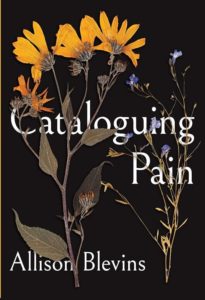 Review by DeMisty D. Bellinger
Review by DeMisty D. Bellinger
In her latest poetry collection, Allison Blevins offers myriad perspective on pain, all kinds of pain, through unflinching poem after poem. Cataloging Pain documents physical pain experienced by a disabled body, as well as the pain of motherhood, of love and sex, and of desire. In intimate but inviting language, Blevins allows us to not necessarily experience pain, but to consider it and how the effects it has on the subject in these poems.
The first poem, “Cataloguing Pain as Marriage Counseling,” lays the groundwork for the honesty and familiar language throughout the entire work, revealing disability, sexuality, and motherhood and how these aspects of the speaker interact and affect the speaker. It is a long poem in many episodic parts, but all connected by pain. The first part of this series is a prose poem, as are so many of the poems in the collection, and it ends with the heavy thought, “An editor once asked in an encouraging rejection letter why the manuscript had to be so depressing.” This serves as an assertive marker of the book’s tone.
Also in this first poem, and on the pages that follow, we learn how the relationship the speaker has with her wife and kids and how they all deal with her chronic pain. We also learn that the speaker does not want pity, but witness and understanding. “You ask how I fell,” the third section begins. And instead of going into the description of pain, she writes, “This is a trap.” She goes into rich descriptions of pain, and at the end of this short section, she eschews a helpless “I’m sorry” with “I’d rather argue.”
Anyone who has experienced any type of pain can relate to the difficulty it is explaining the hurt to others. In deep pain, the one to ten rating or the smiling face emojis can feel both inadequate and humiliating. In another multipart poem, “Diagnosis,” Blevins writes, at the beginning of one section “The pain scale is no longer body or nerves,” and later, in another section, “Those who know better want me to measure, but pain finds new ways to pain,” but still attempts describing the types of hurt she experiences.
In the second part of the book, Blevins poems move to a husband and that relationship, the one the speaker has with him, with their children, and with pain. Part One ends with “Elegy for My Wife,” and it is goodbye to a dead name, an old person, and hello to an eventual husband. It is an almost private poem, a grieving full of love and sex, memories with a person who will no longer exist as before, but anew. But what works beautifully about “Elegy for My Wife” and the movement into the second part of the collection, when wife moves to husband, Blevins allows her spouse’s story of transition to really only live in that poem. She does not overtake it. The book is still about Blevins’ pain overall. It is done seamlessly and with decorum.
The job of any writer is to make the world clear for their readers, and to share their experiences through imagery and metaphor. It is neither easy or pleasant to discuss pain, but Allison Blevins succeeds in sharing her experiences with pain on the page. She never really has to say why she suffers—though sometimes, it’s clear, such as childbirth—because how she suffers is the purpose. Also, Blevins shares what it means to be in love for her, and what motherhood is, especially a motherhood informed by chronic pain and by being queer.
Cataloging Pain by Allison Blevins,
YesYes Books, 2023
$18 | ISBN: 978-1-936919-92-5
DeMisty D. Bellinger is the author of the novel New to Liberty and of the poetry collection Peculiar Heritage, and the forthcoming short story collection All Daughters Are Awesome Everywhere. Her work can be found in various journals and anthologies, in print and online. DeMisty is a creative writing professor in the middle of Massachusetts. She lives at demistybellinger.com .
